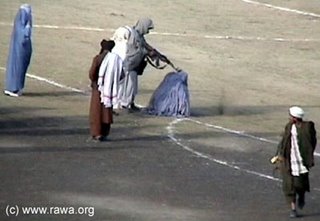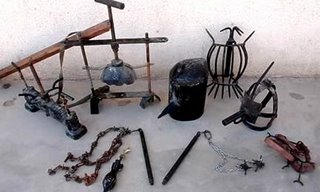A Bad Day at The New Republic


 David Frum's post is so spot on, I can only reproduce it in its entirety:
David Frum's post is so spot on, I can only reproduce it in its entirety:Spencer Ackerman of the New Republic yesterday accused Condoleezza Rice of lying and our own Byron York of disregarding crucial evidence with regard to the Clinton anti-terrorism record.
His crucial point (delivered in the heavily sarcastic style that now unfortunately often pervades the mag's online edition):
"Did you read the 9/11 Commission report? You know, the one that cites Clarke's plan again and again? Start on page 196 and continue to page 214. It's helpful!"
So let's go to that report and see for ourselves.
NRO readers will want to start a little earlier than page 196. Maybe on p. 193, where the report describes the Clinton administration's efforts to respond to the attack on the USS Cole.
President Clinton told us [the authors of the report] that before he could launch further attacks on al Qaida in Afghanistan, or deliver an ultimatum to the Taliban ... the CIA or the FBI had to be sure enough that they would "be willing to stand up in public and say, we believe that he [bin Laden] did this." He said he was very frustrated that he could not get a definitive enough answer to do something about the Cole attack.
That complaint - Clinton wanted to do something, but other people would not let him - is repeated over the succeeding 3 pages. For example, in a Nov. 25, 2000, memo,
[National Security Adviser Sandy] Berger informed President Clinton about a closely held idea: a last-chance ultimatum for the Taliban. Clarke was developing the idea with specific demands: immeidate extradition of bin Laden and his lieutenants to a legitimate government for a trial, observable closure of all terrorist facilities in Afghanistan, and expulsion of all terrorists from Afghanistan within 90 days. No such ultimatum was issued.
On Dec. 21, 2000, the CIA presented a "preliminary judgment" that bin Laden had indeed ordered the attack on the Cole.
This, President Clinton and Berger told us, was not the conclusion they needed in order to go to war or deliver an ultimatum threatening war. The election and change of power was not the issue, President Clinton added. There was enough time. If the agencies had given him a definitive answer, he said, he would have sought a UN Security Council ultimatum and given the Taliban one, two, or three days before taking further action against both al Qaeda and the Taliban. But he did not think it was responsible for a president to launch an invasion of another country just based on a "preliminary judgment."
Richard Clarke's reaction?
Clarke recalled that while the Pentagon and State Department had reservations about retaliation, the issue never came to a head because the FBI and CIA never reached a firm conclusion. He thought they were "holding back." He said he did not know why, but his impression was that Tenet and Reno possibly thought the White House "didn't really want to know," since the principals' discussions by November suggested there was not much White House interest in conducting further military operations against Afghanistan in the administration's last weeks. He thought that instead, President Clinton, Berger, and Secretary Albright were concentrating on a last-minute push for a peace agreement between the Palestinians and the Israelis."
That Clinton needed more evidence before he could act came as news to George Tenet however.
Tenet told us he was surprised to hear that the White House was awaiting a conclusion from him on responsiblity for the Cole attack before taking action against al Qaeda. He did not recall Berger or anyone else telling him that they were waiting for the magic words from the CIA or the FBI. Nor did he remember having any discussions with Berger or Clinton about retaliation.
Onto the famous plan, issued on Dec. 29, 2000, and discussed on pp. 196-197. It originated inside the CIA and proposed the following:
* A major effort to support the Northern Alliance through intelligence sharing and increased funding so that it could stave off the Taliban army and tie down al Qaeda fighters. ...
* Increased support [to the government of Uzbekistan] ....
* Assistance to anti-Taliban groups and proxies ....
Clarke endorsed and amplified these ideas. He set an explicit goal of degrading and weakening al Qaeda over the next five years. He also advocated a resumption of Predator flights within Afghanistan in March 2001. Beyond that,
A sentence called for military action to destroy al Qaeda command-and-control targets and infrastructure and Taliban military and command assts. The paper also expressed concern about the presence of al Qaeda operatives in the United States.
These were the operatives who would strike on 9/11. Is "concern" a plan? You can understand why Rice might think not.
PP. 202-205 describe the new administration's determination to take a more aggressive approach - and how it too bogged down in practice. It's not a story that reflects well on anyone, and there is plenty of blame to go around.
But it is very seriously misleading to suggest that the Clinton administration left behind a plan that would have overthrown the Taliban, destroyed al Qaeda, or stopped or even interfered with the 9/11 attacks. And it is fair to note that the steps they did recommend to their successors were steps they had declined to take themselves, not just in 2000, but over the whole period 1998-2000.
Rice (and York) have the better of the argument.
To Frum's great piece -- an example of expert argument that the Left has seemingly forgotten how to do, since YELLING and SNEERING and STAMPING their feet feels so good, I can only add this coda:
The London Sunday Telegraph recently reported that, soon after the war began, Uday was deeply depressed. According to the former director of Iraqi television quoted in the Telegraph, the last words he heard Uday speak were these: "This time I think the Americans are serious. Bush is not like Clinton. I think this is the end."
And for Uday, it was the end... the end of all of his fun. The bottom picture above is of some of the torture devices that he used on his Olympic soccer team, in those spare, precious moments when he was taking a little time off from kidnapping, raping, torturing, and feeding Iraqi women coated in honey to his Rottweilers.
(Please don't confuse Uday with Qusay -- Qusay never did such a thing... he was the one in charge of feeding his father's political opponents feetfirst into plastic shredders.)

0 Comments:
Post a Comment
<< Home